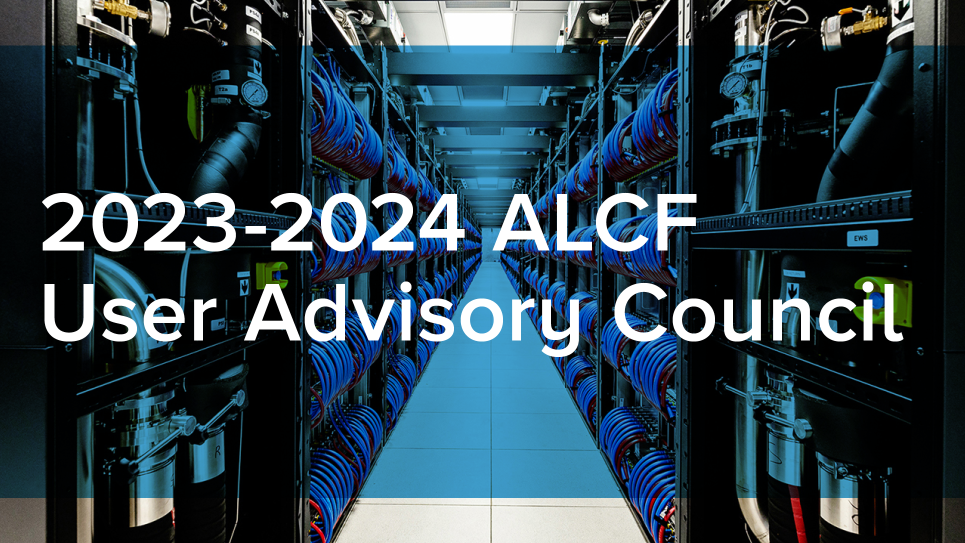
ALCF announces six new User Advisory Council members
The Argonne Leadership Computing Facility, a U.S. Department of Energy Office of Science User Facility at Argonne National Laboratory, recently appointed six new members to its 2023–2024 User Advisory Council.
This council is an advisory body and makes recommendations on current and future ALCF policies and services. Council members are appointed by ALCF’s director and individually hold expertise in the tasks and requirements of specific applications or domain areas. Members are all current or former ALCF users and collectively represent ALCF’s scientific user community.
Yongjun Choi is a research scientist at TAE Technologies, Inc., and the main computational physicist running the particle-in-cell code ECsim on ALCF’s Theta supercomputer as part of a new Advanced Scientific Computing Research (ASCR) Leadership Computing Challenge (ALCC) award.
Olexandr Isayev is an assistant professor and heads the Isayev Laboratory in Carnegie Mellon University’s Department of Chemistry. Isayev’s research focuses on solving fundamental chemical problems with machine learning, molecular modeling, and quantum mechanics.
Eric Johnsen is an associate professor and heads the Scientific Computing and Flow Physics Laboratory in University of Michigan’s Mechanical Engineering Department, where he is also associate chair for undergraduate education. Johnsen’s research focuses on biomechanics and biosystems engineering, energy, fluids, and multiscale computation.
Johan Larsson is an associate professor of mechanical engineering at University of Maryland, where he is also an affiliate of the Applied Mathematics & Statistics and Scientific Computation program, and the Department of Aerospace Engineering. Larsson’s research interests are in the fields of fluid mechanics, turbulence, and predictive computational science.
Ravi K. Madduri is a computer scientist in Argonne National Laboratory’s Data Science and Learning division and a senior scientist at the Center of Research Computing at the University of Chicago. His research interests are in building sustainable, scalable services for science, reproducible research, and large-scale data management and analysis. Madduri will also serve as the chair of the 2023–2024 session.
Vikram Mulligan is a research scientist in the Systems Biology Group in Flatiron Institute’s Center for Computational Biology. Mulligan works on developing computational methods for designing folding heteropolymers.
In addition to these six new appointments, current council member Achiiro Nakano has been reappointed to a second term. Nakano is a professor of computer science, physics & astronomy, and biological sciences at the University of Southern California.
Members of the ALCF user community can contact any member of the council with a question or suggestion at uac@alcf.anl.gov.
==========
The Argonne Leadership Computing Facility provides supercomputing capabilities to the scientific and engineering community to advance fundamental discovery and understanding in a broad range of disciplines. Supported by the U.S. Department of Energy’s (DOE’s) Office of Science, Advanced Scientific Computing Research (ASCR) program, the ALCF is one of two DOE Leadership Computing Facilities in the nation dedicated to open science.
Argonne National Laboratory seeks solutions to pressing national problems in science and technology. The nation's first national laboratory, Argonne conducts leading-edge basic and applied scientific research in virtually every scientific discipline. Argonne researchers work closely with researchers from hundreds of companies, universities, and federal, state and municipal agencies to help them solve their specific problems, advance America's scientific leadership and prepare the nation for a better future. With employees from more than 60 nations, Argonne is managed by UChicago Argonne, LLC for the U.S. Department of Energy's Office of Science.
The U.S. Department of Energy's Office of Science is the single largest supporter of basic research in the physical sciences in the United States and is working to address some of the most pressing challenges of our time. For more information, visit https://energy.gov/science